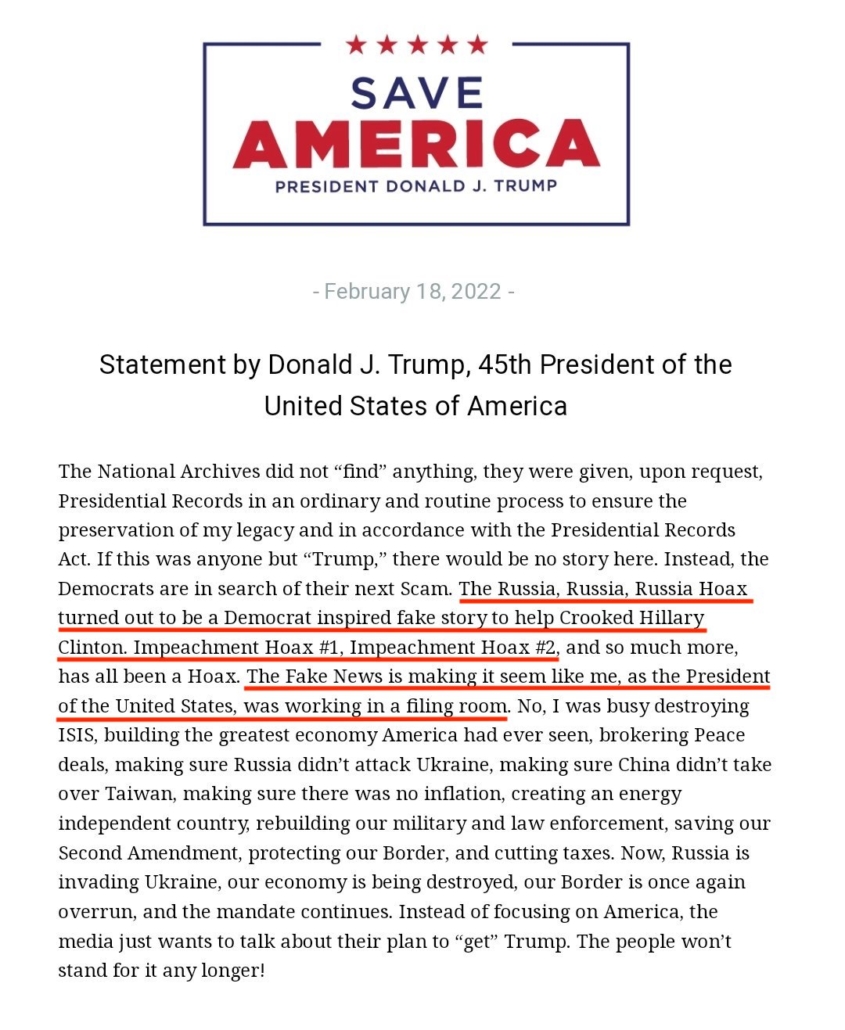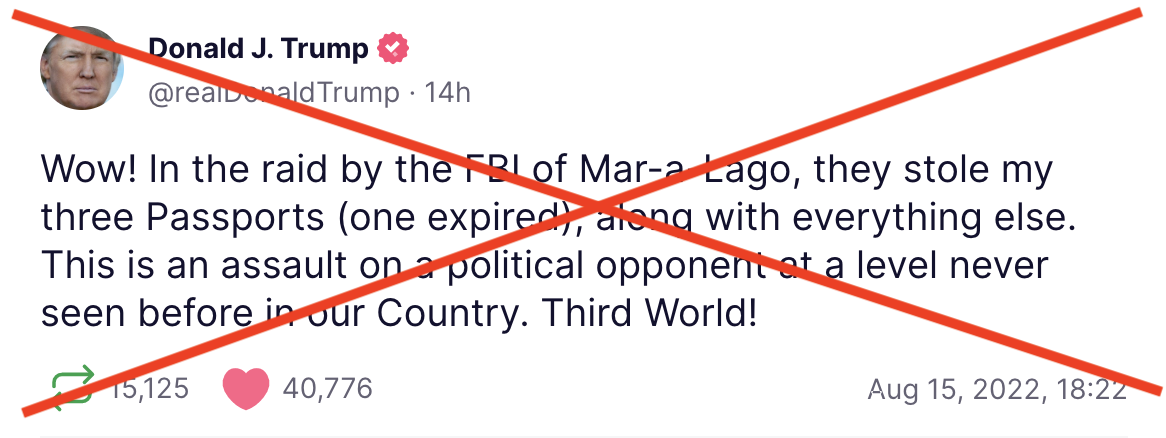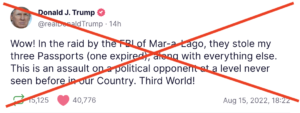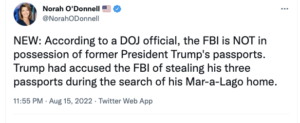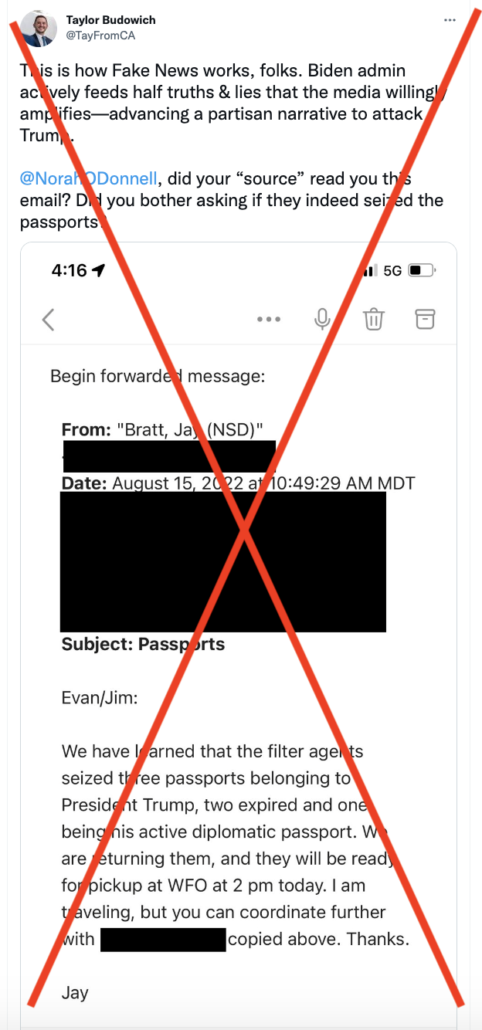Prosecutors Interviewing Witnesses Who Knew Trump Was Hoarding Documents
This article claiming that a grand jury in DC might vote on Espionage Act charges against Trump as soon as today, from a reporter who hasn’t focused closely on the stolen documents case, has gotten far more attention than this WaPo story, saying that the bulk of charges will be filed against Trump in Florida.
The preference for the former over the latter likely stems from the fact that it tells people what they want to hear.
But you should treat the WaPo story, from Spencer Hsu and three others, including Mar-a-Lago scribe Josh Dawsey, as more reliable. Hsu is a very cautious journalist; he’s highly unlikely to get ahead of himself on the report that the bulk of charges will be in Florida, which conflicts with the Indy claim. Plus, WaPo uses none of the caveats that Feinberg uses. WaPo’s story also matches what we know about venue for the suspected crimes.
You should treat the WaPo story as more credible, most of all, because WaPo’s description of Taylor Budowich’s testimony yesterday that makes it clear the grand jury in Florida is considering Espionage Act charges.
As it describes, Budowich withheld a statement Trump wanted to release last year, claiming he had returned all documents.
Prosecutors were at least partially interested in Budowich because of his role in an episode involving Trump in early 2022, according to people familiar with the matter who spoke on the condition of anonymity because grand jury proceedings are secret. After sending boxes of materials from his Mar-a-Lago home and private club to the National Archives and Records Administration, which catalogues and preserves presidential records, Trump drafted a lengthy statement saying he had given “everything” back to the federal government, The Washington Post has reported.
But Budowich did not release Trump’s statement after consulting with lawyers and advisers for the former president, people familiar with the episode said, speaking on the condition of anonymity to discuss internal conversations. At least some of Trump’s advisers did not believe he had returned “everything” at the time, the people said, even though the archives had been asking for months for Trump to give back any government material in his possession, as required by federal law.
Several days later, Trump issued a different statement that did not include the claim that everything had been returned.
Around the same time, a Trump lawyer rebuffed the former president’s request to tell the archives he had returned everything, The Post has reported, because the lawyer was not sure such an assertion was true.
Prosecutors have reviewed a draft of Trump’s statement, which contains at least one tangent about Germany and an overseas oil pipeline, the people familiar with the matter said. Multiple witnesses have been questioned by prosecutors about the statement, the people said, and asked whether Trump ever asked them to lie or mislead anyone about whether he continued to maintain classified information in his possession. [my emphasis]
The discussion over the statement — which WaPo suggests, with their link to their earlier report, included Alex Cannon — suggests multiple people at Mar-a-Lago believed he was hoarding documents. WaPo focuses on the way Trump’s people edited out his claim that he had returned all the documents. That statement wouldn’t present the same legal jeopardy as his later claim, issued via Evan Corcoran and Christina Bobb, to have complied with a subpoena. But it would have ceded NARA’s claim to any remaining documents.
The process of having this discussion left a paper trail for prosecutors to show a more generalized awareness that Trump retained documents — one that may fill in gaps if there is surveillance footage from the “dress rehearsal” missing.
All those people (many of whom would also be key witnesses in Jack Smith’s investigation of Trump’s fundraising fraud) are now on the hook to come clean about their knowledge or go down with Trump. Given the target notice, they may be especially motivated to do so in coming weeks.
I’m interested, though, in WaPo’s mention of the reference to what sounds like the Nord Stream pipeline. In what was likely the statement that Trump did release, he raised the imminent invasion of Russia and claimed credit for preventing any such invasion while he was President.
Because Trump doesn’t have a filter, and because Trump had just sorted through which documents he wanted to retain, any mention of something specific like the Nord Stream may match documents that he held onto. And that would, in addition, tie to some pretty interesting motives, which prosecutors could use at a hypothetical trial.

